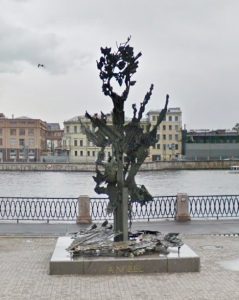
By Maria-Elizabeth Baeva, MSc Candidate, Jefferies Lab
This is the second article in the Nobel Prize blog series. Read the first article in the series here: “Nobel Prize Series Introduction: Pomp and Circumstance?“
Dynamite Scrooge
Ebenezer Scrooge is the rich but miserable businessman who hates Christmas in Charles Dickens’ “A Christmas Carol”. Despite his wealth and power (or because of it), Scrooge refuses to act charitably. Only after a visit by the ghost of his dead business partner and the spirits of Christmas past, present and future does Scrooge realize the error of his ways and becomes a good Samaritan.
In some ways, Alfred Nobel and Scrooge share a life trajectory. Nobel was a complicated figure and his motivation for creating the famous prize are equally complex. Given the influential nature of this prize in terms of bringing fame, recognition and validation to those who achieve it, I think it is important to dissect its origins and to highlight some key events that seem relevant to its formation.
For further reading, I highly recommend “The Nobel Prize: A History of Genius, Controversy, and Prestige” by Burton Feldman, which describes Alfred Nobel’s life in detail.
Family Matters

Monument to Alfred Nobel. Sculpted by Sergey Alipov and Pavel Shevchenko, this monument in St. Petersburg, Russia is dedicated to Alfred Nobel. This semi-abstract piece demonstrates the duality of Alfred’s legacy: simultaneously depicting an explosion and a tree.
Alfred Nobel was born in 1833 and came from great wealth and ingenuity. Born in Sweden, he moved to Russia at age 9 and was a frequent traveller throughout Europe for most of his life, never holding citizenship in any country. Alfred also had some big shoes to fill. Not only did his father, Immanuel Nobel, invent the rotary lathe used in plywood manufacturing, his brothers Ludvig and Robert, the “Russian Rockefellers”, were oil barons of the Caspian Sea. But Alfred became a success in his own right. As a chemist, engineer, inventor and businessman, he held over 355 patents1, including those for nitroglycerine, gelignite (blasting jelly), ballistite, and, most famously, dynamite.
Although his inventions revolutionized engineering and construction, one cannot ignore their horrific use in warfare. Alfred sold these inventions indiscriminately, earning him the moniker “The Merchant of Death”. Nitroglycerine testing in 1864 killed his younger brother Emil; but even that was not enough to stop Alfred. He kept going, inventing new ways to cause destruction, seemingly indifferent as to whether the destruction was aimed towards inanimate objects or living people, all seemingly in the pursuit of innovation.
Le marchand de la mort est mort
In 1888, Alfred’s older brother, Ludvig, passed away. Alfred, living in France at the time, woke to find an obituary published in a French journal proclaiming, “The Merchant of Death is Dead!”. This declaration that mistook the death of Ludwig for Alfred, allegedly caused deep introspection and guilt for Alfred. His final will, written in 1895 without the knowledge of his family or lawyers, would be the foundation of the Nobel Prize.
The will1 itself is quite short, although, in its simplicity, it caused much controversy and complications3. In addition to being almost comically vague, the money was entrusted to a foundation that did not even exist. Alfred didn’t establish the committee or a foundation prior to his death; nor did he leave instructions on how to do so. Additionally, the prize did not allocate money to the administrators and judges overseeing the prize or deciding its recipients. Finally, there was much dispute on whether to consider him a French or Swedish citizen given that he held no official citizenship but had estates in multiple countries.
Both countries stemmed to benefit from this inheritance. Eventually, Sweden won the argument. After resolving most of the debates, the will was honoured, and the prize was finally officially established in 1900.
Posthumous redemption?
Does the establishment of the Nobel Prize make Alfred a good person? A genius for sure, he was lonely and shy yet highly ambitious. Why did the death of his younger brother in the early days not seemingly affect his change to philanthropy as did the mistaken obituary? Why perform this act of charity after his death? Like most of us, he had an inconsistent ideology. For example, as an individualist, he did not trust systems, which is probably why the prize is awarded to people and not institutions. Yet, the handling and awarding of the prize was left to the discretion of several universities.
There are many questions left unanswered. Perhaps the biggest one is this: Does it matter why the prize was created if we assume that the prize is a net positive for the world? Maybe not. But I think in a world where Elon Musk, Richard Branson, Bill Gates, Jeff Bezos and other millionaires and billionaires are now similarly involved in grand acts of charity, we cannot separate the deed from the doer. The lesson here is that although money itself is objective, the donor is not. Therefore, the recipients are necessarily influenced by the donor’s wishes. We still live in the shadow of Alfred’s specific instructions for which fields get awarded and recognized. As we will see in the next sections, the will, in both senses of the word, of Alfred Nobel continues to influence and impact the scientific community even 120 years later.
Sources
1 NobelPrize.org. Alfred Nobel’s patents. Nobel Media AB 2020. Accessed on 26 Sep 2020. https://www.nobelprize.org/alfred-nobel/list-of-alfred-nobels-patents/
2NobelPrize.org. Full text of Alfred Nobel’s will. Nobel Media AB 2020. Accessed on Fri. 25 Sep 2020. https://www.nobelprize.org/alfred-nobel/full-text-of-alfred-nobels-will-2/
3Elin Hofverberg E. (2015, December 7th) Alfred Nobel’s Will: A Legal Document that Might Have Changed the World and a Man’s Legacy. In Custodia Legis. https://blogs.loc.gov/law/2015/12/alfred-nobels-will-a-legal-document-that-might-have-changed-the-world-and-a-mans-legacy/
Arreseigor J.J.S. (2017, October 5th). The Explosive Origins of the Nobel Prizes. The National Geographic. https://www.nationalgeographic.com/history/magazine/2017/07-08/Alfred_Nobel_Founder_Prize/
Burton F. (2000). The Nobel Prize: A History of Genius, Controversy, and Prestige. New York, USA: Arcade Publishing.
Jewell R. (2000). The Nobel Prize: History and Canonicity. The Journal of the Midwest Modern Language Association, 33(1), 97-113. https://www.jstor.org/stable/1315120
Lichtman M. A. (2017). Alfred Nobel and His Prizes: From Dynamite to DNA. Rambam Maimonides medical journal, 8(3), e0035. https://doi.org/10.5041/RMMJ.10311


